

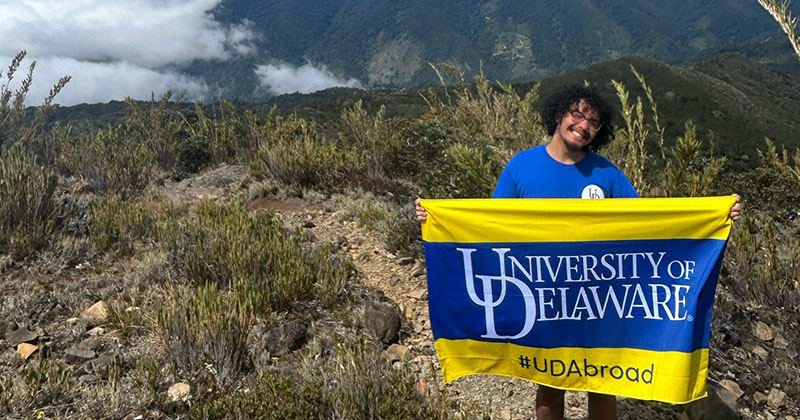
First Generation Blue Hen Scholar
Photos courtesy of Luis Moreno and Grace Ferry May 28, 2025
McNair Scholar Luis Moreno studies animal behavior while promoting cultural exchange
As a child growing up in Wyoming, Delaware, Luis Moreno had a wildlife card game. The goal of the game was to match the cards by species. Instead, Moreno saw it as a research opportunity.
“I glued the cards to poster paper, researched where each animal was from and what it eats, and made an informative poster,” said Moreno, who graduated in May with the UD Class of 2025.
Moreno is a McNair Scholar in the College of Agriculture and Natural Resources. He combines a major in animal science with double minors in insect and wildlife conservation and psychology.
The first-generation college student has journeyed through farms and rainforests to pursue animal science.
The McNair Scholars Program provides a rigorous and supportive environment designed to empower students as they pursue advanced graduate degrees. Scholars develop key competencies in research methodology, leadership, communication, intercultural awareness, and critical thinking.
“To put it simply, being a Hispanic student in an agricultural program is not that common,” Moreno said. “The McNair Scholars Program helps me to build experience. Now that I have research under my belt and attended professional workshops, I feel more confident putting myself out there.”
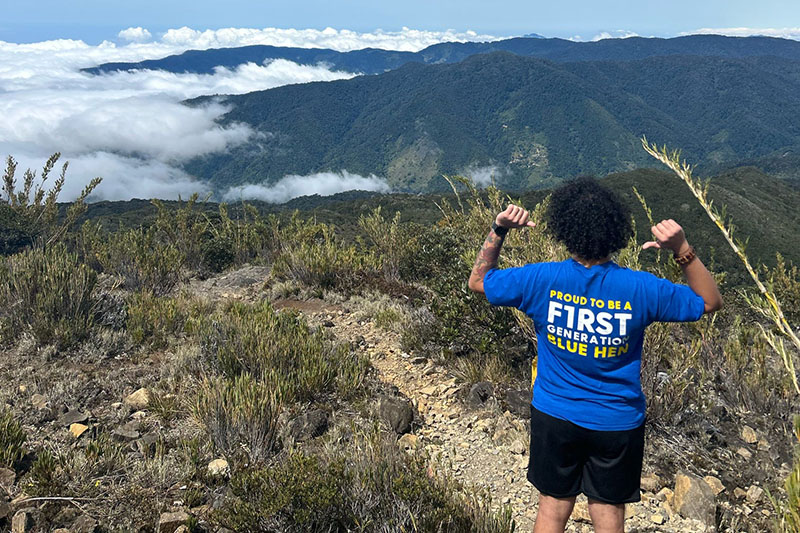
McNair Scholars are required to complete a 10-week summer research experience. Moreno studied feeding behaviors in dairy and beef cows with Tara Gaab, assistant professor of animal science. Moreno was a student in her Animal Behavior (ANFS 350) course.
“The first day of class, as Professor Gaab explained the syllabus, I was in awe,” Moreno said. “It sounded exactly like what I wanted to do, all my different interests wrapped into one!”
Moreno realized Gaab would be the perfect person to advise him during the summer research experience.
“When Luis first approached me about the McNair Scholars Program, I knew this would be an essential experience for him,” Gaab added. “Allowing him to delve into real animal behavior research — little did I know I would accompany him on this journey!”
Gaab and Moreno found a large dairy farm in Maryland willing to host their research.
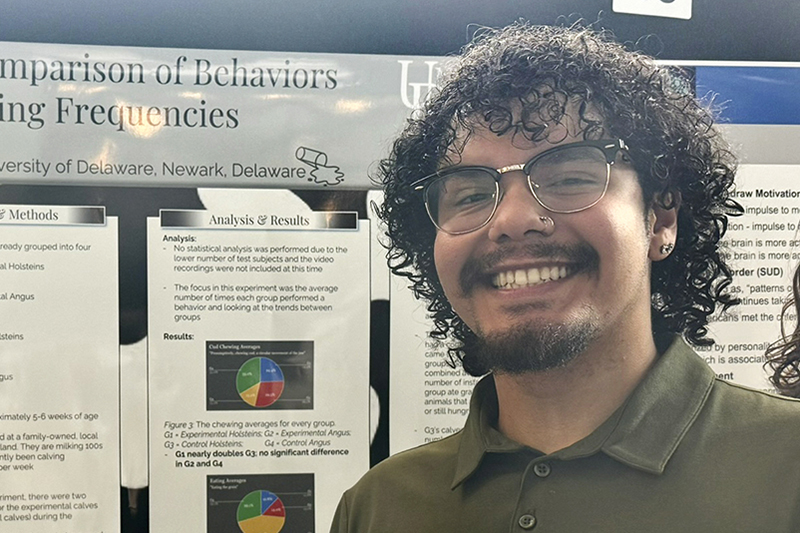
Most calves in the U.S. are single-housed. The practice decreases the risk of injury from calves' natural suckling and rowdy behaviors, but it requires the calves to spend two months in isolation. Consumers increasingly prefer brands that group-house calves.
“Farmers are moving from single-calf hutches to group hutches, which could increase injury and disease,” Moreno said. “Suckling on other cows’ ear tags or fence posts can increase infection. We defined rowdy behaviors as biting, bucking and headbutting. Our research looked at potential ways to avoid these issues.”
They compared the behavior of calves fed twice daily to that of calves fed six times daily.
“The animals who received milk less frequently performed more behaviors that suggested they were bored or hungry throughout the day,” Moreno said.
Gaab is proud of what Moreno accomplished in a short period of time.
“It is incredibly rare for a student to completely devise, plan, carry out, and analyze the data from their project from beginning to end,” Gaab said. “He sat out in the blazing sun for hours observing the calves, made connections with local producers, and learned how to conduct himself professionally (and helpfully) on a busy dairy farm, all in one summer.”
In January, Moreno traded the dairy farm for Costa Rica. He spent the Winter Session in a month-long UD study abroad program with faculty member Kyle McCarthy. He worked alongside other UD students to place camera traps in the rainforest, use acoustic monitoring technology to identify bats, and complete bird point counts. Costa Rica, a biodiversity hotspot, is home to around 900 species of birds.
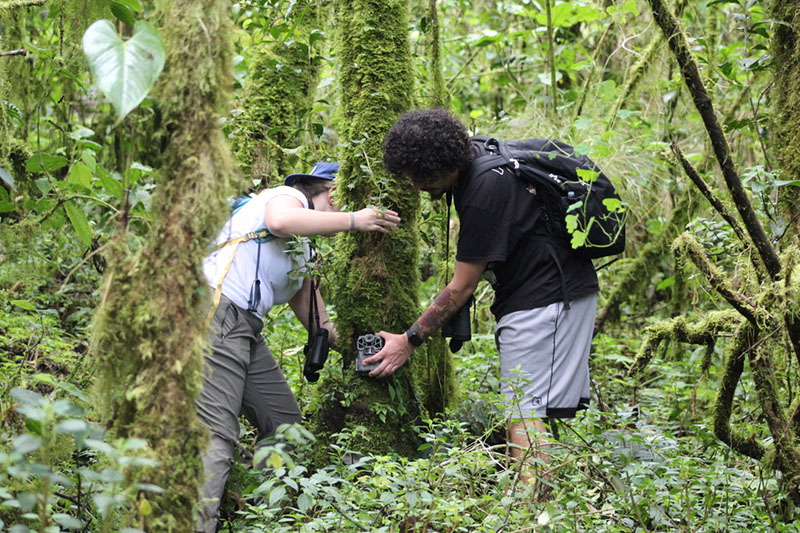
“It felt really special because my parents are from Puerto Rico, but I was born and raised in the U.S.,” Moreno said. “The area where my mom grew up was similar to a few places we stayed in Costa Rica.”
For Moreno, quantifying biodiversity in Costa Rica brought his college experience full circle.
“My parents did so much to get me here,” said Moreno, a first-generation college student. “I'm a Hispanic student in the College of Agriculture and Natural Resources, and that took me all the way to Costa Rica; it was a humbling experience.”
While Moreno focuses his research on animals, he believes in the importance of finding your people. Moreno is an admissions ambassador for UD and a diversity enrichment leader. He gives tours and talks with prospective students during events like decision days, open houses, and receptions.
“At diversity receptions, I speak with students of color and low-income students,” Moreno said. “I help prospective students get a feel of campus. The reception helps students see that there's a safe space for them here.”
Another way Moreno is creating welcoming spaces for UD students is through his work with HOLA, the largest Hispanic/Latinx student organization on campus. He has been on the board for three years and serves as president.
“At HOLA, we teach culture, not Spanish,” Moreno explained. “While we offer a safe space and a home away from home for Hispanic and Latinx students, we also want to share our culture with the rest of the University.”
The group’s events explore topics from gentrification to dance styles. A recent event, “Birds of Paradise,” explored Latin food and music. Moreno loves seeing students’ faces light up when they connect with their peers over shared experiences.
“It heals something in me,” Moreno said. “I was the quiet kid. I didn’t like going out, and I didn't enjoy talking to people. Now I am at the forefront, trying to inspire other students to break out of their shells!”
Rachel Garcia, director of student diversity and inclusion and advisor to HOLA, says Moreno does an amazing job balancing academics, work, and student leader responsibilities.
“As HOLA’s advisor, I’ve witnessed his leadership skills continually blossom over almost three years,” Garcia said. “I’m excited to see all that he achieves after graduation. Luis personifies the kind of leaders we aspire to create here at UD.”
Gaab agrees.
“Luis embodies the curiosity and drive for knowledge we always hope to see in our young scientists. I am so excited to see where he goes next!”
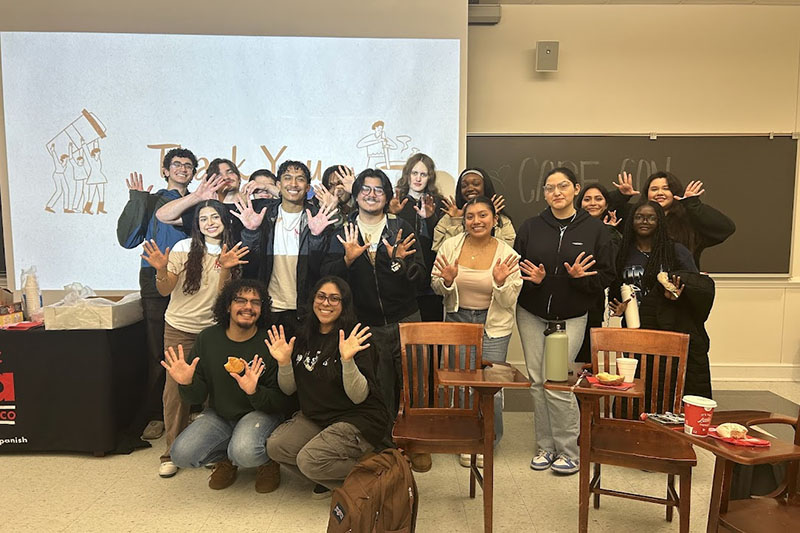
Contact Us
Have a UDaily story idea?
Contact us at ocm@udel.edu
Members of the press
Contact us at mediarelations@udel.edu or visit the Media Relations website

